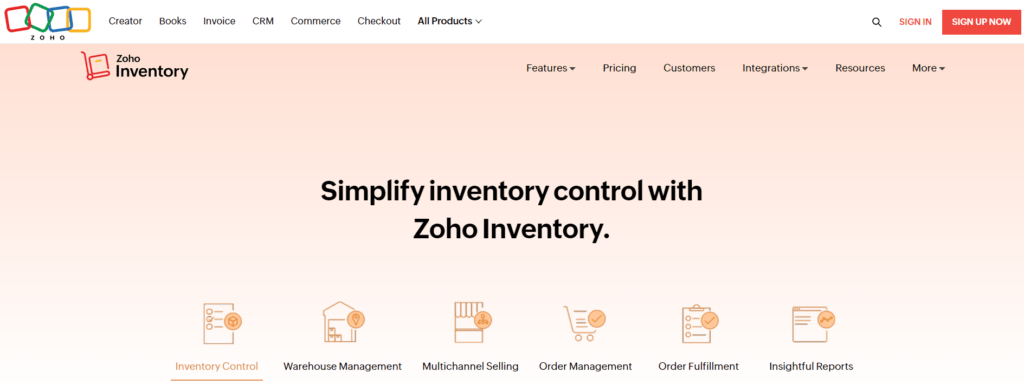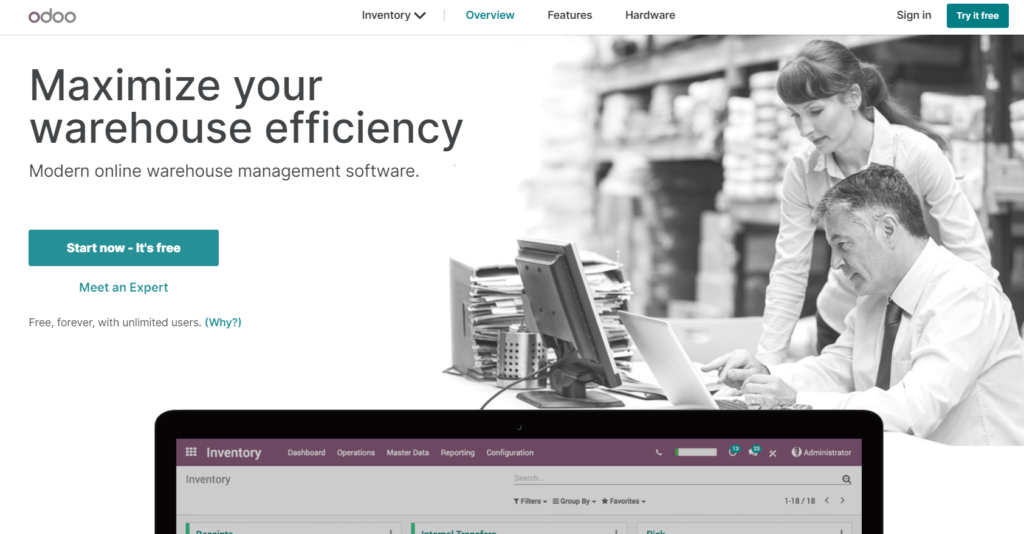As a small business owner, one of the most important aspects of running a successful operation is managing your inventory. Keeping track of your inventory can be a time-consuming and challenging task, but with the right inventory management software, it can be a breeze.
In this article, we will be discussing the top 5 best free inventory management software options for small businesses.
Table of Contents
What is inventory management software?
Inventory management software is a tool that helps businesses track and manage their inventory, including stock levels, orders, and purchasing processes.
It is designed to provide visibility into stock levels, automate tasks, and generate reports to help businesses make informed decisions.
By using inventory management software, businesses can optimize their inventory levels, reduce stockouts and overstock situations, and improve overall efficiency.
Inventory management software is available in various forms, including cloud-based and on-premise solutions, catering to different business needs and preferences.
Some popular free inventory software options include Zoho Inventory, Odoo, inFlow Inventory, ABC Inventory, and Stockpile.
These solutions offer a range of features, integrations, and pricing options, making it possible for businesses of all sizes to find a suitable inventory management solution to meet their needs.

Benefits of Using Inventory Management Software
As businesses continue to grow and adapt to an increasingly competitive market, the role of inventory management software becomes even more essential. Here are some of the top benefits of using Inventory Management Software.
1. Optimized Inventory Levels
One of the primary advantages of inventory management software is its ability to optimize inventory levels. The software uses real-time data to track stock levels, demand patterns, and sales trends.
This information enables businesses to maintain the right amount of inventory on hand, preventing costly overstocking or frustrating stockouts.
By achieving the right balance, businesses can minimize storage costs while ensuring products are readily available to meet customer demand.
2. Enhanced Order Fulfillment
Inventory management software streamlines the order fulfillment process. With accurate and up-to-date inventory information, businesses can efficiently process orders and avoid the risk of overselling products that are no longer in stock.
This leads to improved customer satisfaction as orders are fulfilled accurately and promptly, resulting in positive customer experiences and repeat business.
3. Reduced Operating Costs
Manual inventory tracking is not only time-consuming but also prone to errors. Mistakes in inventory management can lead to financial losses through excess inventory holding costs and missed sales opportunities.
Inventory management software automates various tasks, reducing the need for manual intervention and minimizing the risk of human errors. This automation translates to reduced operating costs and increased overall efficiency.
4. Data-Driven Decision Making
Inventory management software provides businesses with valuable insights through comprehensive reporting and analytics. Business owners can access data on sales performance, inventory turnover rates, and product demand.
Armed with this information, informed decisions can be made regarding inventory purchasing, pricing strategies, and identifying top-performing products.
Data-driven decision-making ensures that businesses are proactive rather than reactive in their approach to inventory management.
5. Increased Scalability
As businesses grow, managing inventory becomes more complex. Inventory management software is designed to scale with the business, accommodating a larger product catalogue and increased sales volume. This scalability is essential for maintaining efficiency and accuracy in inventory tracking and order processing, even as the business expands.
6. Improved Supplier Relationships
Inventory management software often includes features related to supplier management and purchasing. By accurately forecasting inventory needs and timing, businesses can improve their negotiation position with suppliers.
Timely reordering and efficient communication with suppliers foster stronger relationships and can lead to better terms, discounts, and improved supply chain management.
7. Regulatory Compliance
Certain industries, such as pharmaceuticals and food, have strict regulatory requirements for inventory tracking and management.
Inventory management software helps businesses adhere to these regulations by maintaining accurate records of product movement, expiration dates, and batch numbers. This reduces the risk of non-compliance and associated penalties.
8. Centralized Information
Inventory management software centralizes all inventory-related information in one place. This eliminates the need to rely on spreadsheets, emails, or physical records, which can lead to confusion and errors.
Having a single source of truth for inventory data improves communication, collaboration, and overall organizational efficiency.
Top 5 Best Free Inventory Management Software for Small Businesses
Zoho Inventory
Zoho Inventory is a cloud-based inventory management software on our list that offers a free plan for up to 50 monthly online orders.

It offers features such as inventory tracking, order management, and integrations with other Zoho products, such as Zoho CRM, Zoho Books, and Zoho Analytics, allowing seamless data sharing and collaboration across different departments.
It integrates with popular e-commerce platforms, shipping carriers, and payment gateways, making it easy to manage your entire inventory and order fulfillment process from one platform.
Features
Zoho Inventory offers a wide range of features to help businesses manage their inventory effectively, including:
- Inventory Management: Track stock levels, set reorder points, and manage multiple warehouses. The system automatically updates stock levels as sales and purchases are made.
- Order Management: Manage sales orders, purchase orders, and transfer orders in one place. You can create, edit, and track orders and generate invoices and packing slips.
- Warehouse Management: Organize and manage multiple warehouses, track stock transfers, and monitor stock levels across locations.
- Integrations: Zoho Inventory integrates with various e-commerce platforms, shipping carriers, and payment gateways, including Shopify, Amazon, eBay, WooCommerce, FedEx, UPS, and Stripe.
- Barcode Scanning: Scan barcodes to quickly update stock levels, process orders, and perform stock takes.
- Reporting and Analytics: Generate detailed reports on sales, purchases, inventory levels, and more to make informed business decisions.
- Mobile App: Access your inventory data on the go with the Zoho Inventory mobile app, available for iOS and Android devices.

Pros:
- User-friendly interface
- Integrations with other Zoho products
- Real-time inventory tracking
Cons:
- Difficult to set up for beginners
- Limited to 50 online orders per month on the free plan
- Limited customer support on the free plan
Odoo
Odoo is an open-source suite of integrated business applications designed to help organizations manage various operations, such as sales, finance, human resources, manufacturing, and more.
It offers a modular approach, allowing businesses to choose and customize the applications they need to meet their specific requirements.
Odoo’s applications are built on a unified platform, which enables seamless data sharing and collaboration across different departments.

Odoo integrates with various third-party applications and services, such as payment gateways, shipping carriers, and e-commerce platforms.
Odoo offers a robust API, allowing developers to create custom integrations and extend the platform’s functionality.
Pros:
- Open-source and free-to-use
- Wide range of business management tools
- Easy to customize
Cons:
- Difficult to set up for beginners
- Limited customer support on the free plan
- It can be overwhelming, with too many features.
inFlow Inventory
inFlow Inventory is a comprehensive piece of software designed to help small and medium-sized businesses manage their stock, orders, and purchasing processes.

The software aims to streamline inventory management, automate tasks, and provide real-time visibility into stock levels and order statuses. inFlow Inventory is available in both cloud-based and on-premise versions, catering to different business needs and preferences.
inFlow Inventory integrates with popular e-commerce platforms, shipping carriers, and accounting software, making it easy to manage your entire inventory and order fulfillment process from one platform.

Some notable integrations include Shopify, WooCommerce, QuickBooks Online, and Xero. Additionally, the software offers an API for custom integrations and extensions.
Pros:
- User-friendly interface
- Integrations with other software tools
- Real-time inventory tracking
Cons:
- Limited customer support on the free plan
ABC Inventory
Almyta Systems created ABC Inventory, which is free inventory management software. It is designed to help small and medium-sized businesses manage their stock, orders, and purchasing processes.
The software aims to streamline inventory management, automate tasks, and provide visibility into stock levels and order statuses. ABC Inventory is an on-premise solution that is installed and runs on your local computer or server.
While ABC Inventory is free, Almyta Systems offers paid support and upgrade options for businesses that require additional assistance or functionality. These options include:
- Support Plans: Almyta offers various support plans that provide access to technical support, software updates, and additional features. Pricing for these plans varies depending on the level of support and features required.
- Almyta Control System (ACS): For businesses that outgrow the capabilities of ABC Inventory, Almyta offers a more advanced inventory management solution called Almyta Control System (ACS). ACS includes additional features like multi-user support, advanced reporting, and integrations with third-party applications.
Pros:
- Tools for forecasting and demand planning
- Real-time inventory tracking
- Free to use
Cons:
- Only available on Windows operating systems
- Limited customer support
- Limited integrations with other software tools
Stockpile
Stockpile is a free, cloud-based inventory management software for small and medium-sized businesses.
It aims to simplify inventory management, automate tasks, and provide visibility into stock levels and order statuses.
Stockpile is an easy-to-use solution that can be accessed from any device with an internet connection, making it convenient for businesses with limited resources or technical expertise.
Stockpile offers a range of support resources, including a help centre with articles and tutorials and email support for technical assistance. However, it’s important to note that the level of support may be limited compared to paid inventory management solutions.
Pros:
- User-friendly interface
- Barcode scanning
- Integrations with other software tools
Cons:
- Limited customer support on the free plan
- No mobile app
Best Inventory Management Software for E-commerce
Regarding e-commerce inventory management, there are a few additional factors to consider. These include:
- Integration with e-commerce platforms such as Shopify or WooCommerce
- Real-time inventory syncing with e-commerce platforms
- Automated order fulfillment and shipping
- Returns management
Based on these factors, the best inventory management software for e-commerce is Zoho Inventory. Its integrations with other Zoho products and real-time inventory tracking make it a great option for small businesses selling products online.

How Free Inventory Management Software Benefits Small Businesses
Effective inventory management software can offer a multitude of benefits for small businesses, including:
1. Streamlined Operations: Inventory software automates various tasks, such as order processing, stock level monitoring, and replenishment planning. This automation reduces the risk of human error and allows you to focus on strategic aspects of your business.
2. Improved Order Fulfillment: With real-time inventory tracking, you can fulfill orders more accurately and quickly, leading to higher customer satisfaction and repeat business.
3. Cost Savings: By preventing overstocking and reducing stockouts, inventory management software helps optimize stock levels, minimizing storage costs and maximizing sales opportunities.
4. Data-Driven Insights: Most software solutions provide detailed reports and analytics, enabling you to make informed decisions about inventory purchasing, pricing, and overall business strategy.
5. Scalability: As your business grows, inventory management software can adapt to your changing needs, making managing a larger product catalog easier and increasing efficiency.
Conclusion
Managing your inventory is crucial to running a successful small business, but it can be time-consuming and challenging. However, it can be a breeze with the right inventory management software.
By considering factors such as your budget, the size of your business, and your industry, you can choose the right inventory management software for your needs.
With features such as real-time inventory tracking, integrations with other software tools, and reporting and analytics, these top 5 best free inventory management software options will help you maximize your efficiency and grow your business.
Frequently Asked Questions
What is inventory management software, and why do small businesses need it?
Inventory management software helps businesses track, organize, and manage their inventory levels, orders, and sales. Small businesses must have a system in place to efficiently manage stock, avoid overstocking or stockouts, and streamline operations.
Are these free versions truly free, or do they come with limitations?
These software options offer free versions but often have certain limitations. These limitations can include restrictions on the number of products you can manage, users who can access the software or features like integrations and advanced reporting. It’s important to review the limitations of each software to ensure they meet your business needs.
IF MY BUSINESS GROWS, can I upgrade to a paid plan for more advanced features?
Most of these free inventory management software options offer paid plans with additional features and capabilities. As your business grows and your needs evolve, upgrading to a paid plan can give you access to advanced functionalities such as multi-location tracking, serial number tracking, and more integrations.
What are the benefits of using free inventory management software for small businesses?
Using free inventory management software for small businesses can provide several benefits. Firstly, it helps businesses keep track of their inventory levels, ensuring they have enough stock to fulfil customer orders while avoiding overstocking.
It also allows businesses to streamline their order management processes and improve efficiency. Additionally, free inventory management software often integrates with other systems, such as accounting software, making it easier to maintain accurate financial records.
Can free inventory management software help with warehouse management?
Yes, free inventory management software can help with warehouse management. These software solutions typically provide features for warehouse management, such as organizing inventory items, managing stock levels, and facilitating easy access to the location of items within the warehouse. This helps businesses optimize their warehouse operations and ensures efficient storage and retrieval of inventory items.
How easy is it to use free inventory management software?
Free inventory management software is designed to be user-friendly and easy to use, especially for small businesses. These software solutions often have intuitive interfaces and clear navigation and provide step-by-step guides or tutorials to get started. Many free inventory management software options require little-to-no technical expertise, enabling small businesses to adopt and implement these systems quickly.
Do these software options offer mobile apps for on-the-go inventory management?
Some of these software options provide mobile apps that allow you to manage your inventory, orders, and sales from your smartphone or tablet. This can be particularly useful for small business owners who need to stay connected and make quick decisions while on the move.






